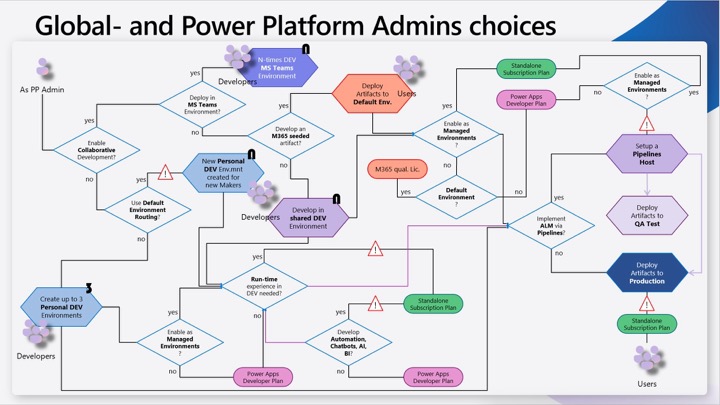
Enterprise-Grade Governance with Microsoft Power Platform
Unlock the power of Microsoft Power Platform with insights on enterprise-grade governance from a recognized expert.
Understanding Power Platform and Enterprise-grade Governance
At the Microsoft Power Platform conclave held recently in Las Vegas, key insights were shared about enterprise-grade governance. Amidst the buzz of the event, important aspects were discussed which might have been overshadowed; they primarily targeted Global and Power Platform administrators aspiring to create an easy-to-manage environment along with developing user-friendly tools.
Key topics of the discussion included automatic claim for Power Apps licenses, a public preview of Default Environment Routing, incentivising developers to create developer environments, and introduction of pipeline delegated deployments or simply put, SPN.(More information about Power Platform)
The Vice President of Power Apps, Ryan Cunningham, mentioned the importance of enterprise-grade governance in the era of Artificial Intelligence.
Considering Power Admin Choices
The blog author Carsten Groth shared his opinions on whether to enable default environment routing or not, presenting a comprehensive graphical depiction of the decision-making process involved for a Global or Power Platform administrator. Therefore, he also provided some food for thought about the Total Cost of Ownership (TCO)’s reduction impact using admin and governance tools in this AI age.
The diagram illustrates multiple possible decision paths for Global and Power Platform administrators, starting with asking formal/general questions, before delving deeper into binary (yes/no) decisions. It showed numerous considerations, like creating developer environments, combining the 'Managed Environment' feature, control of sharing to co-developers or testers while avoiding any user directly using any developer artefacts, and others.

Another significant focal point was ensuring easy maintenance and lowering IT costs, which brought into consideration Managed Environments. These are activated for Development environments. The diagram also explained different aspects of runtime experience (mainly used during test scenarios) and when developing artefacts that weren't part of the Power Apps developer plan license.
Here, auto-claiming for Power Apps licenses would play a significant role. Ryan mentioned that an admin's primary goal is IT cost reduction and easy maintenance, in which Managed Environments for Development proved beneficial.
Conclusion
In conclusion, active discussions on the platform emphasized automated software processes, environment routing, incentivizing developers, and pipeline allocations. The commentary concluded that these can collectively reduce costs, ensure easy maintenance, consolidate shared development environments, and most importantly, automate licensing for Power Apps.

Learn about Power Platform | Enterprise-grade governance
The Microsoft Power Platform Conference (MPPC) serves as an important ground for knowledge sharing on Microsoft's advanced tools and features. This recently held event generated significant information around enterprise-grade governance that's invaluable for Global and Power Apps admins. These details can sometimes get overlooked within the rapid influx of news, but they hold the key to better tool adoption strategies for developers and users.
The topics that were highlighted include:
- Auto-claim for Power Apps licenses.
- The public preview of Default Environment Routing.
- Enabling your creators by creating Developer environments on their behalf.
- Pipelines delegated deployments (SPN).
Further insights that were shared related to transforming enterprise-grade governance in the age of Artificial Intelligence (AI). This underscores the crucial role of effective governance in the AI-driven world we live in.
Prior articles shed light on key considerations around enabling default environment routing and the impact of utilizing governance tools and admin centered solutions for reducing Total Cost of Ownership (TCO) in the age of AI. However, throughout the conference, it became clear that more clarity was necessary for Global and Power Apps admins choices after recent announcements.
To elucidate on this, a visual was created to outline a simplified decision journey that begins with some formal/general questions moving onto more complex decisions. It also covers the newly introduced option of creating Developer environments on their behalf and combining these with the Managed Environment feature.

It is understandable that administrators may question the need to enable Managed Environments for their Development environment. The benefits, such as a weekly digest or extended backup feature, although vital, are not as immediately recognizable as the control of sharing. You can limit sharing to either co-developers or testers in each development environment, to ensure that users do not directly use any developer artifacts that may be pointing to non-productional data sources.
Furthermore, the main goal as an admin is to ensure easy maintenance and cost-effectiveness, another crucial advantage of choosing Managed Environments for Development environments. Another point worth noting is around runtime experience (mainly used during test scenarios) or when developing artifacts that are not part of the Power Apps developer plan license.
We also should understand how to run effectively Auto-claim for Power Apps licenses in your strategy, as it could play a significant role in this whole setup.
Lastly, Pipelines in the Power Apps platform and the supporting delegated deployments (SPN) announcement are new capabilities that are beneficial for all forms of low-code generated artifacts.
However, one must always remember to proof-check results by using the latest and official licensing information available. This visual is to be considered as reference and not as definitive resource.
More links on about Power Platform | Enterprise-grade governance
- Security and governance considerations in Power Platform
- Oct 5, 2022 — Governance is the answer. It aims to enable business groups to focus on solving business problems efficiently while complying with IT and ...
- Admin and governance best practices
- Feb 27, 2022 — In this section, we'll explore some best practices to follow when establishing admin and governance for Microsoft Power Platform. Manage icon
- Microsoft Power Platform security and governance ...
- Microsoft Power Platform security and governance documentation. Learn how to set up and maintain security and governance for Power Platform.
Keywords
Power Platform governance, Enterprise-grade governance, Microsoft Power Platform, Power Platform Management, Enterprise Governance Strategy, Power Apps Governance, Power Automate Governance, Power Platform Security, Power BI Governance, Microsoft Power Platform Administration.